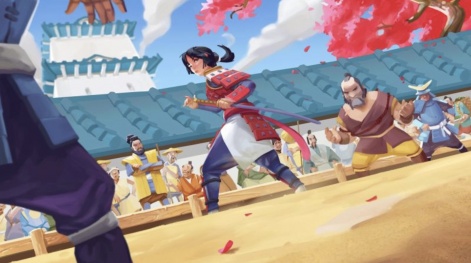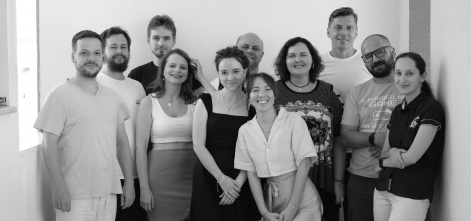Founded back in 2020, Colossi Games is focused on creating engaging and innovative mobile RPG games. So far the studio has seen the release of action-brawler Gladiators: Survival in Rome and action RPG game Daisho: Survival of a Samurai, which recently surpassed one million downloads.
We caught up with Colossi Games CEO Manuel Prueter to discuss the challenges of games development, how smart studios can overcome them and what's on the horizon for Colossi.
Pocketgamer.biz: Tell us a bit about yourself and how you got started in the games industry.
Manuel Prueter: Oh, it was so random, there was no dream about it. I was trying to study economics, but one day back in 2005, I was hanging out in Teamspeak of a Dark Age of Camelot guild when a guild mate dropped in and asked me if I could imagine doing customer service for the German community of Guild Wars, which was still in beta. Two weeks later, I was hired and moved to Brighton, England.
A couple of gigs later, I found myself in Moscow in 2016, with a doomed-to-fail-financially MOBA game as my first touchpoint with mobile games. Revenue could not support the team, and marketing budgets were pulled, so I had to make do with trying to figure out organic growth. That game never recovered, and eventually, we had to shut it. Still, it was probably the most important learning experience that invoked my passion for leaning into what players want instead of what they are being sold.
My brother-in-law is a pretty awesome game designer, having worked on a game that is a top-grossing title. So we just had to make something together, right?Manuel Prueter
Tell us about Colossi Games. What makes Colossi different?
My brother-in-law is actually a pretty awesome game designer, having worked on a game that is a top-grossing title. So we just had to make something together, right? Then, from a recommendation of common acquaintances, we met our CTO, and that was essentially the birth of Colossi Games in 2020, with Play Ventures and later EQT as midwives, providing the funding.
In the middle of the pandemic, we all had to be remote and only a year later would unite in Cyprus, so all processes are asynchronous, and more than half the team are actually working from somewhere else - we have people in Germany, Georgia, Bali, Israel, 25 people now. It takes a certain mindset to hire (or be hired) to pull this off, with a healthy mix of passion, respect for the craft of colleagues, taking responsibility and, of course, motivation and pride in the outcome. Only two people have left us in these three years, both because they needed a local job for visa purposes in their desired locations. Knowing each other for two or three years helps immensely when working together.

Tell us about Daisho. What were the aims for the game?
As a base, every game we produce aims to strike the right balance between delivering a great experience and a solid financial return to keep the lights on. With our debut game, Gladiators: Survival in Rome, things were running well for nine months, but circumstances changed - markets, economic downturn, global politics but also the performance marketing arena: CPI just stayed up from the 5th season, and we lacked runway to create the tech and content to improve LTV within the next six or so months.
So we had the choice: Do we throw money into the ad machine with the hope of a 20% net margin as many developers and publishers do? Think about it: A team of 25 costs $200k in our region monthly. That means you’d need a million in ad spend, and you are not guaranteed to get that out. So for us, it was the better choice to build on our existing tech and make a game that is at least equally popular thematically as our debut game but also addresses players from other regions less familiar with the Roman Empire. The most revenue for Daisho comes from Taiwan and Korea, not the US.
Tell us about the game's development. What were the main challenges and how did you overcome them?
There is just one overarching challenge for us: The war in Ukraine. Our team is completely Russian-speaking, with team members from both countries (and surrounding, like Belarus). With mixed families, with mixed friends. The 24th of February 2022 was a devastating moment for us, emotionally. We had launched our debut game two days earlier, and suddenly none of this mattered because tears had to be shed, relocation organised, friends and family members had to be guided to safety.
For the business, of course, that meant less productivity, 20% less of the expected revenue, no means to advertise, and costs for visas and initial housing for families of staff. We had to adapt a lot because stability is needed in such situations. Luckily, our investors were on the same page, even if this meant a slowdown of what they signed up for. I have nothing but gratefulness to everyone coping and navigating this.
Against that, everything else pales in comparison. I am pretty vocal publicly when it comes to revenue squeezing from platforms with their IDFA and Privacy Sandbox antics, with clinging to cronyism for editorial control, with investors who should rather bring the money to the bank for the guaranteed payout their mind is expecting while never leading a deal.
In actual development, the biggest problem was an arbitrary metric Google Play introduced called ANR. Go above the threshold, and your organic traffic will plummet. We fought that for the better part of a year, and it requires a deep technical understanding to get to the bottom of. But again, these are mere nuisances.
Instagram feed ads, a TikTok clip, editorial promotion. For me, this is the basis for marketing, a visual translation service for existing desires.Manuel Prueter
How did you bring the game to market? How did you go about promoting the game?
OK, please take this with a grain of salt: I have no expert knowledge of marketing a match3 game outside of ad arbitrage. These products are arcane to me, with a sophistication level in analytics and UA which are simply amazing to me.
What we do is visual, interactive storytelling. A player longing for, let’s say, a Samurai game has an image in their head. This image then is either translated directly into a search request - and it’s our job to translate ‘samurai’ or ‘ninja’ back into a conforming image piquing their interest - or stored unconsciously until triggered by situational effects: Instagram feed ads, a TikTok clip, editorial promotion. For me, this is the basis for marketing, a visual translation service for existing desires. From this foundation, the rest is tactics and, frankly, budget.
As for what we actually did. We had pre-registration pages for just over a month, some pre-registration marketing on Google Ads (cannot recommend too much), proper universal App Store Optimization to improve on later, a game landing page to direct traffic, and a PocketGamer article to talk about the existence of the game in hope to be picked up by others. Simple Meta and Google Ads campaigns for performance marketing testing, familiarising ourselves with SKAN4, and some Apple Search Ads too. We’re only three people in marketing, so we’ll pick our avenues wisely.
And you changed your marketing strategy and gameplay in order for the title to find its audience? Tell us about what changes you made.
Yes, a second game allowed us to experiment with the business model. Where in Gladiators, we have an energy-based, content-driven model, with a lot of LiveOps asking to be rewarded if players want to play longer in a session. And this was how we started in Daisho too. But just four weeks into the launch, we changed that entirely. Instead we used a grind-avoidance strategy, designing the game around more dense locations and steeper crafting paths.
Testing what sticks better and is honoured by players financially without endangering the studio's livelihood is crucial. I feel like the dance on the runway edge makes us stronger by focusing on what is important as an entertainment business.

What makes Daisho special? What's the 'secret to your success'?
It sounds corny, but it comes down to love for craft and theme in our team. Look, we have our game designer Pasha, who was the national champion of Smash Brothers or something, and who stuffed the relocation container half full with just manga, probably much to the dismay of his wife. If that guy does the narrative for a Japan-themed game, and he’s a good game designer on top of that, you’ll have a recipe for something outstanding.
There’s Karyna and Julia, who are my tag team for marketing visuals. They love posting on Instagram and doing their own TikTok stuff, so of course they have a natural proclivity to do something good for UGC content and embedding this with our games.
So, in short: Putting people with the right attitude in the right place and moving out of the way so they can create magic.
What's next for Daisho and what's new from Colossi Games?
Daisho will inherit a lot of the game features that have been present in Gladiators already - a guild system, seasonal events, and more content introduced with LiveOps. We also just developed our battlepass system as a precursor to achievements. In two weeks, the releases for Steam and Google Play Games will go live to enable our players to enjoy the game on whichever device they prefer, and we’re looking into third party app stores too.
And then? Who knows! We have plenty of features to build and themes to make games for, but also a certain thirst for using our tech and ability to make use of established IPs. Provided there’s a publisher who wants to make that happen, we would get excited about it.
That being said, we stay mobile-first. There’s a lot of chatter in the industry about moving to PC and consoles. That’s basically trading the most accessible and available device spec with some changing market conditions for higher development budget risk, less performance control on paid UA, and for PC into one single platform that is incredibly launch heavy.
It’s great to see some games go viral, and those developers deserve all the praise, but I’m not sure if it is a wise business model, especially when the space gets more crowded. We stay bullish for mobile and keep working to entertain players everywhere.






















